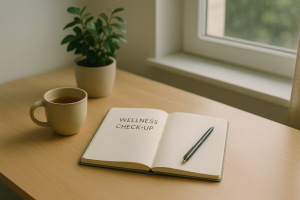In our pursuit of productivity, sleep is often treated as optional — something to be trimmed, sacrificed, or postponed. For many, sleep is the first thing we compromise when schedules fill up, deadlines loom, or anxiety kicks in. Yet, paradoxically, the very function we try to squeeze more time out of — cognitive performance — is the one most deeply dependent on sleep quality.
Sleep is not a passive state. It’s not a nightly pause in your brain’s activity — quite the opposite. It’s an intensely active process of neurological maintenance, reorganization, and integration. In this article, we’ll explore how the quality of your sleep directly influences your ability to think clearly, retain information, make decisions, and remain emotionally resilient. And just as importantly, we’ll explore natural strategies to support deep, restorative sleep without falling into dependence on stimulants or artificial aids.
Why the Brain Needs Sleep: More Than Just Rest
During the day, your brain operates like a high-speed processing unit. It absorbs stimuli, stores short-term memory, solves problems, and navigates complex emotional and sensory input. But that work creates a kind of “neural residue” — molecular byproducts that build up as you think, act, and react. Sleep, especially deep non-REM sleep, is when the brain performs its cleanup.
In recent years, researchers discovered the glymphatic system, a brain-specific waste-clearing mechanism that activates during sleep. This system flushes out toxins, including beta-amyloid — a protein linked to neurodegenerative conditions — more efficiently than when you’re awake. It’s like your brain’s night crew, cleaning and resetting for another day of cognitive work.
Without this essential detox, attention becomes scattered, memory retrieval slows down, and emotional reactivity increases. Chronic sleep deprivation doesn’t just make you tired — it dulls your decision-making, impairs creativity, and makes even small problems feel overwhelming.
Sleep and Cognitive Functions: A Breakdown
Let’s look at how different types of cognitive performance are impacted by sleep:
Memory consolidation
During sleep, especially REM stages, the brain processes and organizes short-term memories into long-term storage. This is why people who study or practice a skill and then sleep retain more than those who stay awake afterward.
Executive function
Sleep deprivation affects the prefrontal cortex, the part of your brain responsible for impulse control, decision-making, and problem-solving. Even a single night of poor sleep can cause this system to misfire.
Attention and alertness
Sleep influences your ability to filter distractions and stay focused on a single task. Without it, even simple tasks feel cognitively heavy, and multitasking becomes inefficient.
Creativity and insight
REM sleep has been linked to the brain’s ability to make abstract connections — the “aha!” moment often comes after a good night’s sleep.
Emotional regulation
A tired brain overreacts. Sleep-deprived individuals have higher amygdala activity (the brain’s fear center) and reduced control from the prefrontal cortex. That’s a recipe for mood swings, irritability, and low resilience.
In essence: Sleep is cognition.
The Difference Between Sleep Quantity and Sleep Quality
It’s not just about how many hours you sleep — it’s about what happens during those hours. Quality sleep follows a predictable rhythm of sleep stages: light sleep, deep sleep, REM, and cycling back through. Disruptions (such as waking up multiple times, shallow breathing, environmental noise, or even blue light exposure) can prevent your brain from completing those cycles.
Signs your sleep quality might be poor even if you’re “in bed for 8 hours”:
You wake up feeling foggy or unrested.
You need caffeine to function before noon.
You feel mentally sluggish in the afternoon despite sleeping “enough.”
You struggle to remember details or stay focused.
Improving quality often has a greater impact than increasing quantity.
What Affects Sleep Quality?
Several natural and environmental factors can erode or enhance sleep:
Light exposure
Your circadian rhythm is regulated by natural light. Bright light in the morning helps reset your internal clock, while artificial blue light at night (from screens) can suppress melatonin production — the hormone that signals sleep readiness.
Temperature and air quality
The body prefers a slight drop in core temperature during sleep. Overheated rooms or stuffy environments can disrupt deep sleep phases.
Mental state before bed
Mental overstimulation — including watching intense media, reading work emails, or ruminating — can prevent the brain from winding down. A calm, transitional period is key.
Eating patterns
Large meals or excessive sugar before bed can spike energy and cause metabolic interference during sleep stages.
Stimulants and alcohol
Caffeine even six hours before bedtime can reduce total sleep time. Alcohol, while sedating initially, interferes with REM sleep and contributes to fragmented rest.
Natural Techniques to Improve Sleep and Boost Cognitive Performance
Let’s now turn to natural, accessible ways to enhance the quality of your sleep and, as a result, your cognitive clarity during the day.
1. Create a “wind-down window”
Dedicate the final 60–90 minutes of your day to slowing down. No screens, no intense conversations, no work. Instead, engage in calm activities: light reading, stretching, herbal tea, journaling.
Sleep is not a switch. It’s a dimmer.
2. Design a sleep-supportive space
Your bedroom should be dark, quiet, and cool. Invest in blackout curtains if needed. Eliminate clutter. Consider air-purifying plants or essential oils like lavender. Sleep is more likely to deepen in a sensory environment that signals safety and calm.
3. Anchor your circadian rhythm naturally
Get sunlight exposure within 30 minutes of waking — even 10 minutes can reset your sleep-wake cycle.
Avoid bright screens 1–2 hours before bed.
Try warm light lamps or candles during your evening routine to mimic dusk.
4. Movement during the day = better sleep at night
People who move regularly sleep better. This doesn’t mean intense workouts — just consistent walking, stretching, or yoga improves deep sleep and reduces sleep latency (how long it takes to fall asleep).
5. Breath and body awareness
Simple practices like deep diaphragmatic breathing or body scans can bring the nervous system out of sympathetic (fight-or-flight) mode and into parasympathetic (rest-and-digest). Even 5 minutes in bed before sleep can improve sleep depth.
6. Use natural cues to signal sleep
Over time, your body associates behaviors with outcomes. By creating a consistent ritual — for example, brewing a cup of herbal tea (like chamomile or lemon balm), turning on a specific soft playlist, dimming lights, or stretching — you can train your brain to “recognize” bedtime.
Cognitive Gains from Better Sleep: What to Expect
When you prioritize sleep, you begin to notice benefits across many aspects of life:
You learn faster — information “sticks” more easily.
You make better decisions — weighing risks and evaluating outcomes becomes easier.
You communicate more clearly — mental fog lifts, and your language processing improves.
You regulate emotion more effectively — conflicts feel less overwhelming.
You feel more creative and solution-oriented — novel connections become easier to spot.
And perhaps most importantly: You enjoy your mind again.
Conclusion: Your Brain’s Best Investment
Sleep is not a luxury — it’s a cornerstone of human performance. It is the bedrock upon which concentration, memory, and emotional clarity are built. When you improve your sleep quality, you’re not just resting more — you’re thinking better, deciding better, and living more fully.
In a world that constantly tells us to do more, sleep invites us to pause — and in doing so, return sharper, more balanced, and more awake than ever.
Start tonight. Your brain will thank you tomorrow.







